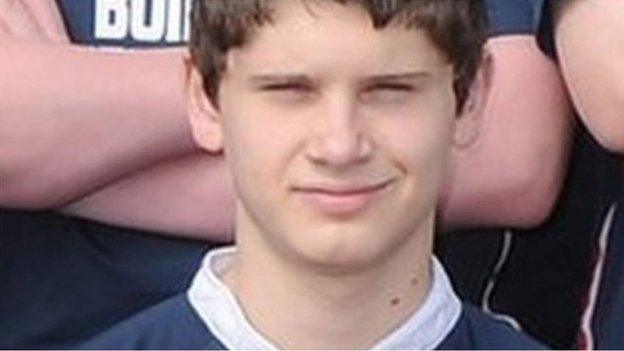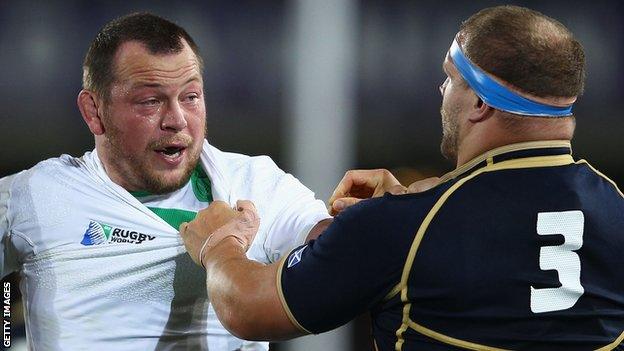Vibrant, awesome and loving - father's anniversary tribute to son who died at 14 playing rugby
- Published

A coroner found that Ben Robinson died from "second impact syndrome"
A father whose son died after suffering concussion while playing a school rugby match has paid a glowing tribute to a boy who "lived life to the full".
Sunday marked the 10th anniversary of 14-year-old Carrickfergus schoolboy Ben Robinson's death after he collapsed near the end of a match.
A coroner found that his death was caused by "second impact syndrome".
"We say vibrant, awesome and loving - those three words sum him up," Peter Robinson told Sportsound Extra Time.
"His first love was football and Manchester United. He was one of those kids who knew all the statistics and would hit you with them - things like 'do you know how much he cost?' and 'do you know how many caps he has?'.
"It was funny, I would be driving in the car with him and would realise that I had switched off and he was still talking about it all.
"He had this smile, you couldn't really be angry with him. He was just a really good kid, a real mediator who was living life to the full. I called him Ben but he always said he liked being called Benjamin, because it made him sound more important."
'Ben was someone's miracle'
Ben was involved in several heavy tackles before collapsing near the end of the game and his father has spent the 10 years since working hard to raise awareness of concussion in a bid to prevent more deaths across all sports.
Reflecting on Ben's death, Peter, who lives in Scotland, said it is hard to believe it was a decade ago, but also revealed a positive aspect amongst the family's sorrow.
"It seems very strange that it is 10 years ago - it just underlines that Ben is gone. You realise what you were doing 10 years ago and receiving that phone call," he continued.
"Getting that call was when the divide between Belfast and Edinburgh seemed like you were on the other end of the universe. Just trying to get across, all of a sudden all the little events start joining up and you remember that period.
"The 29th (of January) was the day of the rugby match and then Sunday (31 January) was the anniversary of when we were told the news that he wasn't going to make it."
A day after Ben's death, five people received some of his organs.
"It is really mixed emotions because five people lived and that helps with the grieving when you think that something positive has happened," added Peter.
"Those people were looking for a miracle and Ben was someone's miracle."
'You only get one brain - you need to look after it'

Steve Thompson played 73 times for England
The issue of brain injuries is very topical, with the UK Government this week hosting a summit to gather evidence from governing bodies and sporting figures.
In December, England's Rugby World Cup winner Steve Thompson and seven other former players claimed the sport has left them with permanent brain damage - and were starting a claim against the game's authorities for negligence.
Peter has worked tirelessly since his son's death to raise awareness around the issue and believes that a change in the terminology is extremely important.
"What I have noticed recently is that we are starting to call concussion rather than what it actually is, which is traumatic brain injury," he said.
"Terminology is very important because concussion comes off the tongue very easily, but once you mention traumatic brain injury, it is like what I call the 'meerkat syndrome'.
"People sit up and listen and think 'right, OK'. We have come a long way, but there are still things we should and could do.
"Concussion and traumatic brain injury is a public health issue, it is not just a sporting issue. It is about changing that culture where people will go 'well, he has had a wee knock but he will be alright'.
"No, hold on, it is a traumatic brain injury and if you do not deal with it properly then it can be, and has been, fatal.
"It's all very well, you can have your shoulder or hip replaced, but you only get one brain and you just need to look after it.."
'We have to learn from tragic events'
Peter has worked closely with the Scottish Government to provide information on how to recognise sports concussion, and how this should be managed from the time of the injury through to a safe return to sport.
He is happy with the traction that the 'if in doubt, sit them out' campaign has had in Scotland, but feels a lot more can still be done across all sports at all levels - and used a personal anecdote to illustrate his point.
"Ben's sisters and brother all play contact sports, but if you ask their coaches they will tell you what the concussion policy is, they will know it.
"I have seen it for myself. Ben's younger brother was concussed in a football match he was playing. He was removed straight away and as he was being taken off the pitch the referee said 'sure he can come back on in five minutes if he is ok'.
"That drives you to do more because you live in a bubble where your whole life is trying to raise awareness and sometimes you get a little shock to the system where you realise it is not out there as much as you would like.
"There is risk in everything we do, but just don't mismanage the risk. We have to learn from these tragic events, adapt and change."
Click here to listen to Peter Robinson's full interview on this week's Sportsound Extra Time.